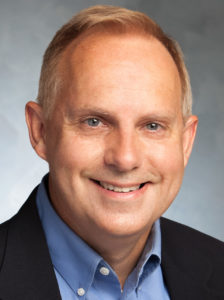Last fall, my hometown of Austin, Texas, put a monumental public transportation bond question on the ballot: light rail, tunnels underneath downtown, electric buses. Austin’s Capitol Metro called the plan “bold.” Another way to say that: “Billions.”
Austin voters have considered less-expensive public transit bonds in recent years and voted them down while Austin grows and grows and grows.

Greg Garrett
My son Chandler and I were hiking shortly after Election Day, and after talking through everyone at the top of the ballot, he asked how I had voted on this bond issue.
“For it,” I told him, and there was a short silence as he processed.
“I guess I’m a little surprised by that,” he said. “Because you’ll never use it.”
Which is true enough. My wife and I drive cars, we live on the outer limits of Austin proper, and as much as I love trains, it’s unlikely I’ll ever come into town and take one to the airport.
“I know,” I told him. “But it feels like an issue of justice.”
He nodded, I nodded, and we moved on.
Despite our self-definition as a city of great food, hospitality and live entertainment, Austin has become almost impossible to live in for musicians and people working in the service industries. East Austin has squeezed many Black and brown people out of affordable housing and replaced them with high-end condos and high-income tech workers.
A public transit plan simply seems like one small step toward redressing issues of justice and equity and making my city more livable for everyone.
It feels like one small thing government can do to make people’s lives better, not worse.
“A public transit plan simply seems like one small step toward redressing issues of justice and equity.”
These words also emerge, of course, immediately after Texas has suffered from the greatest winter storm in living memory and a governance failure of tragic enormity. Our past governor and the former U.S. Secretary of Energy, Rick Perry, was warned about the possibility of such a calamity while he was governor in 2011, yet he postured for the national media by saying that Texans would rather endure loss of power and loss of life than endure federal regulation.
The current governor of Texas, Greg Abbott, initially blamed Democratic policies that haven’t been enacted and green energy for our disaster, despite the fact that his party has controlled the Texas legislature and every single statewide office for almost 25 years. He then shifted to blaming the non-regulatory agency ERCOT, a “market-based patchwork” that seemingly exists to sell Texas energy to the highest bidder, and invited the Texas Legislature to take action to upgrade our energy grid, although they have repeatedly chosen not to do so, and will not do so now despite this catastrophe.
And of course, our junior but best-known U.S. senator, Ted Cruz, decided the middle of the greatest climactic crisis of Texas lifetimes was an appropriate time for a beach vacation in Cancun. (Here’s what Saturday Night Live had to say about that.) People who don’t hold state-wide office, and politicians who don’t even live in Texas stepped up to try to help. But Sen. Cruz could not be bothered to exert his considerable influence as a senator.
Why try to govern if you’re not really interested in governance?
It’s a challenging thing to think about faith and government, partly because, as I’ve often written, when faith gets mixed up with politics it is almost always to faith’s detriment. But so many elected officials these days seem to seek and hold office not to actually help their constituents, but to hold performative roles. To tweet the tweets. To gain a national profile.
“When faith gets mixed up with politics it is almost always to faith’s detriment.”
From our past president on down, being in public office lately has seemed to be largely about playing a role and owning the Dems, or whoever the opposition might be. Q-Anon devotee Marjorie Taylor Greene exulted in being taken off her Congressional committees, since she was only there to own the Libs: It’s awesome — I have all this power and I don’t actually have to help anyone. I can just get on social media and increase my profile.
I don’t want to exempt my own political party: Gov. Andrew Cuomo of New York gave great press conferences about the pandemic but has bullied and berated people and drastically underreported COVID deaths. His commitment to good governance can and should be called into question.
Yes, individual and institutional charity matters, and we are called to it. Thousands of verses in the Bible speak about our responsibility to widows, orphans, the alien — the folks Jesus called “the least of these.” The larger concerns of our faith are love (love God, love your neighbor), service and sacrifice.
So it is that the act of effective governance — actually using government to help people, especially those people who need help — should intersect with our faith at the point of suffering. Whatever we think about politics, whatever our political party, here is precisely where we are called to action.
In the pandemic, over and over again we have learned that people of color and the poor are suffering more than anyone else. How is this just?
In the recent storm in Texas, people of color and people without resources disproportionately went without power and water, watched their pipes burst, and worried that their kids might starve or freeze to death. In my upper middle-class Northwest Austin neighborhood, we lost power only once and never went through that hardship again during so-called rolling blackouts. Our greatest suffering, to judge by the ongoing emails among the folks in my neighborhood, was when our internet might be back up.
How is this just?
“You shouldn’t trust governance to people who don’t believe in government.”
It’s often been said — by Blessed Molly Ivins, who I still need like oxygen — that you shouldn’t trust governance to people who don’t believe in government. When Ronald Reagan — for whom I voted — said government was the problem, he ignored the fact that for people who aren’t privileged, government may be the solution of last resort. What else has the power to offer transformative and ongoing help in such sweeping crises as pandemics and disasters?
So if the United States government, if the government of Texas, abdicate their responsibility to help their citizens in crisis, hoping that the free market or private charity will solve every problem (whatever their virtues, clearly they do not and cannot), it becomes incumbent on all of us who are people of faith, all those Dr. King called people of good conscience, to argue that this is what our governments should do.
This is why we pay taxes for services we will never utilize.
This is how — through the agency of secular governance — we help care for our neighbors.
We can disagree about some political issues, but when it comes to the poor, the suffering, the hungry, one central political truth emerges from the mangled wreckage of the past year: Government can help.
It can help. And it should.
Greg Garrett teaches creative writing, film, literature and theology classes at Baylor University. He is the author of two dozen books of fiction, nonfiction, memoir and translation, including the critically acclaimed novels Free Bird, Cycling, Shame and The Prodigal. He is one of America’s leading voices on religion and culture. One of his most recent nonfiction books is In Conversation: Rowan Williams and Greg Garrett. His latest book, A Long, Long Way: Hollywood’s Unfinished Journey from Racism to Reconciliation, is new this year. He is a seminary-trained lay preacher in the Episcopal Church. He lives in Austin with his wife, Jeanie, and their two daughters.


